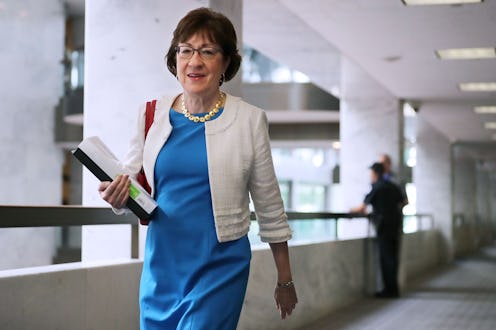
On Monday, Sen. Susan Collins of Maine announced that she will be voting "no" on the most recent Republican attempt to repeal and replace Obamacare — the Graham-Cassidy bill. Collins noted that the bill does not do enough to protect people with pre-existing conditions and cuts Medicaid too deeply. And although she did not discuss it when announcing her decision to vote no, the senator also likely took issue with issue with the bill's essential defunding of Planned Parenthood, as Collins has always noted that her support for the organization is unwavering.
Defunding Planned Parenthood has long been the goal of many Republicans in the House and Senate. Provisions to defund the organization, which provides essential and affordable sexual and reproductive health to women all over the country, have been included in every iteration of an Affordable Care Act repeal-and-replace bill that has been proposed in Congress since the advent of the Trump administration. Many Republicans view the organization as lying counter to their own pro-life stances, even though Planned Parenthood provides many essential health services beyond abortion.
Despite the desires of many in her party, Collins has always remained steadfast in her support for Planned Parenthood. Indeed, after health care legislation was unveiled in June that defunded the organization for a year by blocking it from receiving Medicaid reimbursements, Collins did not mince words when it came to critiquing her party's desire to defund Planned Parenthood.
She explained to George Stephanopoulos on ABC's This Week why it doesn't make sense to take funds away from Planned Parenthood.
There are already longstanding restrictions on the use of federal funds for abortion, so this is not what this debate is about. And Planned Parenthood is an important provider of health care services, including family planning and cancer screenings for millions of Americans, particularly women.
Moreover, in July, following her "no" vote on what was called a "skinny repeal" of Obamacare, Collin again cited the misguided nature of Planned Parenthood defunding provisions in health care legislation — and also explained how she believes that defunding Planned Parenthood goes against the Republican ideal of freedom of choice in seeking health care. Collins captured these sentiments in a statement she released on her website:
[I]ncluded in all of these plans is a misguided proposal that would block federal funds, including Medicaid reimbursements, from going to Planned Parenthood. Millions of women across the country rely on Planned Parenthood for family planning, cancer screening, and basic preventive health care services. Denying women access to Planned Parenthood not only runs contrary to our goal of letting patients choose the health care provider who best fits their needs, but it also could impede timely access to care.
Let me be clear that this is not about abortion. ... This is about interfering with the ability of a woman to choose the health care provider who is right for her. This harmful provision should have no place in legislation that purports to be about restoring patient choices and freedom.
In addition to providing essential services for all American women, Planned Parenthood plays a particularly important role in Collins' home state of Maine. As the organization noted in a recent press release, in Maine, 10,000 people a year seek care at Planned Parenthood health centers. Moreover, three of the four Planned Parenthood centers in Maine are located in medically underserved communities.
Collins' heroic stance against defunding Planned Parenthood, coupled with the fact that it plays a crucial role in providing health services for women in her state, means that her opposition to Graham-Cassidy is unsurprising. In addition to defunding Planned Parenthood, the bill also allows insurers to charge women thousands of dollars more for maternal health and eliminate marketplace insurance coverage for abortion.
While Collins did not specifically mention Graham-Cassidy's defunding of Planned Parenthood in her statement explaining her planned "no" vote for the legislation — the senator cited Medicaid cuts, rising premiums, reduced coverage, and limited pre-existing condition protections as her rationale — the fact that she has historically opposed defunding the organization likely means that she also disapproved of the continued inclusion of this provision in the bill.
Overall, Collins has repeatedly remained steadfast in her dedication to ensuring that Planned Parenthood's funding is not eliminated — and her recent decision to vote "no" on Graham-Cassidy once again shows that her commitment is unwavering.